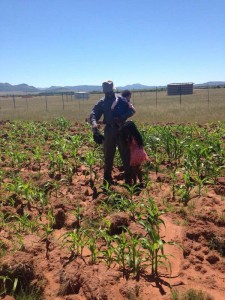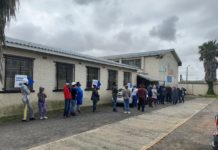With high rates of unemployment and huge inequality, many South Africans are unable to pay for their children’s university fees. KOTAMILE DLAKAVU (72) worked as a truck driver for 36 years and managed to put all six of his children through university. He spoke to Pontsho Pilane about his family’s struggle.
I grew up very poor. My father was a sheepherder and he could not afford to give us much. I only went up to Standard One [grade three] in school but I realised that not having an education would limit me, so when I was 18 I saved up to do my learner’s and my driver’s licence. I knew there would be more opportunities for me with a driver’s licence – this was my only choice.
I started driving tractors in 1966, when apartheid was really bad. We were told that black people were not allowed to drive trucks and all we could do was drive tractors. I didn’t see myself driving a tractor all my life because I wanted to make money but for three years I drove a tractor.
Then in 1970, just after I got married, I started driving trucks. My wife also did not finish school and did not have an education, but she learnt basic admin skills on the job. She worked as a clerk at a textile company until she got retrenched in 2011.
We had our first child in 1974 and eventually had six children – four girls and two boys.
Being a truck driver means you are not home a lot. I worked and lived in Mpumalanga, while my family was in the Eastern Cape. My wife also worked away from home, so my mother took care of our children. I would send money to her every fortnight. The only time I would go home was in December.

When I was home during December I would take them to the beach and do special things with them. I was fortunate that my children understood that I had to work for them.
Because of the laws of apartheid, I could not save money in a bank but I was able to save at the post office. I learnt to save at a young age because my goal was to provide a better life for my children.
When my eldest daughter went to university. She initially wanted to study law. I wasn’t sure she would pass, so I encouraged her to do teaching instead. In the end, she studied education and public administration. Two of my daughters studied engineering and now work for Eskom.
My eldest son also studied engineering – he even got a scholarship to study his master’s degree in China and now he works for a big international company. My other son also studied engineering, and works for a shipping company in Cape Town.
My youngest child is Simamkele, she is the well-known one in the family because she is a writer and an activist. She studied politics and international relations. She is doing well for herself, and is passionate about helping other people.
I would not have managed their tuition fees on my own, so they had to apply for funding through the National Student Financial Aid Scheme (NSFAS) and they also got university merit awards for doing well. That helped a lot. When the older children started working they also helped out the younger ones financially. This is common in many families.
My children knew that they needed to contribute to their younger siblings’ education so that they too could make something of their lives. When my last born was in first year, she did not have NSFAS or a scholarship – her brothers and sisters would give her money for clothes and food.
My children are my biggest achievement. I am not an educated man, but I made sure my children were better off than me. Today, I sleep with a peaceful heart each night because I know that I have done all that I can for my children and that they are making a difference in society.
– As told to Pontsho Pilane

![Kotamille Dlakavu [slider]](https://www.thedailyvox.co.za/wp-content/uploads/2015/08/Kotamille-Dlakavu-slider.jpg)







